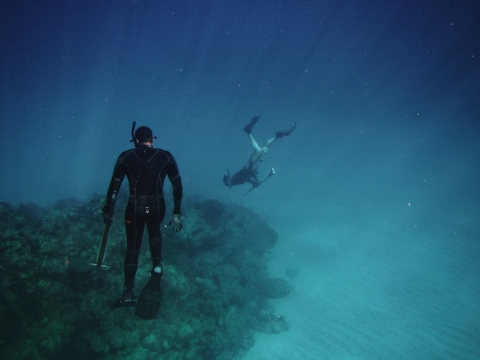

A pilot scheme has successfully improved species extinction risk assessment, by making the process more accessible to researchers from underrepresented countries
6 July 2022
A team of experts tasked with reassessing the extinction risk of reef-building corals has made the process more inclusive and diverse, by increasing participation of local researchers.
The IUCN Red List of Threatened Species is the world’s most comprehensive information source on the global extinction risk of animals, fungi and plants. Developed over 50 years ago by the IUCN, it influences policy development and priority setting at a global, regional, and national level.
In 2008, the first-ever worldwide assessment of reef-building corals was carried out, revealing one third were threatened. However, a lack of information meant many species were assessed as ‘Data Deficient’.
A decade later, the IUCN SSC Coral Specialist Group, chaired by Dr David Obura, began a global reassessment to update the Red List of Threatened Corals. The bulk of the project was due to take place in 2019 and 2020, but plans were interrupted as a result of the Covid-19 pandemic. Assessments which had previously been carried out in-person could now only be conducted online, which gave the team an opportunity to widen the geographical scope of the work.
This new system gives local researchers an opportunity to directly impact the survival of species
Francoise Cabada-Blanco , School of Biological Sciences at the University of Portsmouth
“By doing the assessments virtually, it significantly improved the quality of the assessment”, said Dr Francoise Cabada-Blanco, from the School of Biological Sciences at the University of Portsmouth and the EDGE of Existence programme at the Zoological Society of London.
“We went from having 10 assessors from 5 countries for Caribbean coral species in 2008, to 26 from 12 different countries in the reassessment. So far, they have evaluated 72 species of corals in the Atlantic – including the Caribbean and Brazil – with over 50 other experts signed up to assess more than 600 in the Indo-Pacific.
The research team used a crowd-source approach through online collaboration to make it a more sustainable process. Contributing countries for the Atlantic and Caribbean assessment included the Netherlands, Australia, Mexico, Venezuela, UK, Dominican Republic, Kenya, Brazil, Costa Rica, and France.
Other benefits to the online system included an increase in non-published peer-reviewed literature, research articles from national and regional journals, and published literature not written in English.
Dr Cabada-Blanco added: “Geographic gaps in information reflect an underrepresentation of mid to low-income countries. This new system gives local researchers an opportunity to directly impact the survival of species.”
This week (Tuesday 5 July), Dr Cabada-Blanco on behalf of the team presented the results of the pilot scheme at the 15th International Coral Reef Symposium in Bremen, Germany. There was also be a Red List of Corals Review Workshop at the end of the symposium.
Virtual platforms for assessments, planning and action open the doors to many experts that may face financial and travel barriers that effectively exclude them
Dr Jon Paul Rodríguez, Chair of the IUCN Species Survival Commission
Dr Jon Paul Rodríguez, Chair of the IUCN Species Survival Commission, said: “A major priority for SSC is to increase the diversity of the leadership and membership of the Commission in terms of geography, age, gender, discipline and institutional setting.
“Virtual platforms for assessments, planning and action open the doors to many experts that may face financial and travel barriers that effectively exclude them. I look forward to further exploration of similar approaches throughout the SSC network.”
The preliminary results of the Red List assessments are due to be published later in the year.
